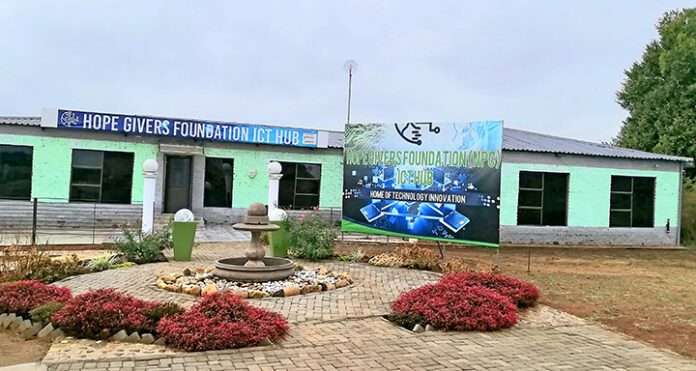A multimillion-rand ICT hub to support small-, medium-, and micro-sized enterprises (SMMEs) in Limpopo is at risk of becoming a white elephant as a dispute with a local traditional authority threatens its future.
The hub was constructed last year in the village of Mhlava in Tzaneen by Hope Givers Foundation, a non-profit company, with funds from the Small Enterprise Development Agency (Seda).
The foundation was awarded R5-million by Seda to set up the hub to assist start-ups through an incubation programme and digital and business solutions to support to SMMEs in the province.
Built in the area under the leadership of the Nkuna traditional council, the hub was expected to be fully operational at the start of this year as part of the five-year-long project.
However, its official launch by Small Business Development Minister Stella Ndabeni Williams was postponed twice last year.
In addition, its funding for operational costs has still not been released by Seda, despite being approved, forcing the NPO to dip into funding of its other projects as it is inundated by SMMEs requesting assistance. Hope Givers Foundation CEO Tsakani Muhlari said her woes started when she had a fallout with the Valoyi Traditional Authority Trust (VTAT), under the leadership of chief Tinyiko Nwamitwa. The daughter of Nwamitwa, princess Tsakani Nkambule, is a Seda board member.
Before the hub made its permanent home in Mhlava, the foundation was renting premises situated in Nwamitwa village, belonging to the trust. This was from March to August last year. Muhlari said the relationship between her foundation and the trust soured when the terms of the rental agreement were not met.
“First, instead of three buildings as per the rental agreement, we had access to only one building because the other two were still occupied by other tenants, but we paid the full agreed monthly rental amount of R41 525.
The landlord (the trust) told us that the tenants would vacate the premises at the end of March. This did not happen.
“We were painting and preparing the one building as we waited for the other two buildings to be vacant,” she said.
Muhlari said she got the shock of her life two months into the lease when in addition to rental amount she was slapped with a R11 744 electricity bill.
“We had not even occupied the building; only painters were working on site during the day. Except for a standard drill, no other electrical equipment was used. So what is the high electricity bill for?”
She said the relationship became more strained when the electricity bill for the third month doubled to more than R20 000. In addition, she said, donors and partners were refused access to the building to do routine inspections.
Muhlari said partners and possible donors were turned away from the hub by security guards protesting not being paid.
“Security guards and cleaners were informed that we, as Hope Givers Foundation, were responsible for paying them. This was not part of the agreement,” she said.
Muhlari said she terminated the lease with immediate effect in August, citing the high occupational rent for only one building, electricity bill, accessibility threats to clients, security, and goods and asset safety.
“After submitting our notice to vacate, we received a letter from the VTAT lawyers demanding an alarming R2.5-million of the Seda funds,” she said.
She said she approached the neighbouring Nkuna traditional council, where the hub is situated, and began building the ICT hub, which also includes a training centre.
The construction was completed in November last year, but Muhlari alleges that Nkambule is using her powerful position as a Seda board member and a member of the Valoyi royal family to frustrate the implementation of the project.
She said about 20 businesses from 34 villages that had been identified to benefit from the hub’s incubation programme were being assisted with resources from its other projects.
About 80 to 100 more businesses, which are supposed to benefit from its virtual programme are not able to get the assistance they need as funds are running dry.
“We had to lay off nine people because we are struggling to keep the centre running,” said Muhlari.
“The revenue generation initiatives we launched as part of creating a self-sustaining ICT hub long after the Seda funding period ends are not yet sufficient to keep the lights on,” she said.
Follow @SundayWorldZA on Twitter and @sundayworldza on Instagram, or like our Facebook Page, Sunday World, by clicking here for the latest breaking news in South Africa.



